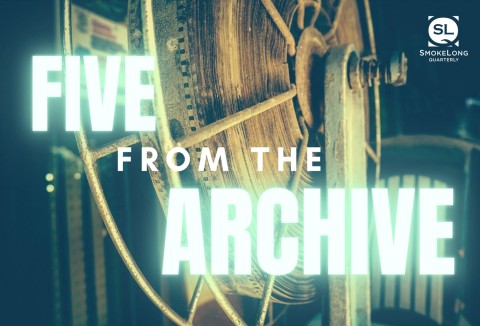
The following is part of SmokeLong‘s series Five from the Archive, which fulfills a need for teaching resources in the flash-narrative community and beyond. In this installment, Helen Rye takes a look at five stories demonstrating naturalism in the SmokeLong story archive. Check out the category Flash in the Classroom on the SmokeLong blog for more ideas for teaching flash narratives in your creative writing classroom.
_________________________
by Helen Rye
A little while back I had a brief correspondence with a novelist I hugely admire in which the question arose of whether naturalism might be difficult to represent in flash fiction. This took me directly down a great grassy meadow’s rabbit-warren of reading to try to understand this subject better, and to see what examples I might be able to find in our archives.
We publish a lot of realist narratives at SLQ, but naturalism is more complex and interesting than just a choice of whether or not to allow dragons and disappearing body parts into a story.
Naturalism brings an unflinching, untinted lens to the natural environment and to humanity, the sort of gritty realism we love at SLQ. It takes a Darwinian, deterministic, semi-experimental view of fiction, setting up environments or histories for characters that predispose them to behave in certain ways or suffer a certain type of fate. The link between cause and effect in the character’s psychology is pretty fixed, and their end is shown to be the more or less inevitable outworking of heredity and/or the world around them. Qualities such as courage and cruelty are natural products of circumstance and have no moral value; this is a universe in which humanity is entirely alone, free will an illusion. The naturalist writer sends characters on their way through the story to play out these natural consequences, perhaps via inciting incidents that are a little like your school chemistry teacher firing up the Bunsen burner and surveying the class with ‘Who can tell me what is going to happen next…?’
The naturalist writer brings no romantic idealism to the narrative, but does have a theory, and the story in some way demonstrates it. Emile Zola’s 1893 essay on The Experimental Novel proposed that the writer was no longer to be an observer, but an experimenter. He compared this to the way medical science had evolved to believe that the human body behaved in a mechanistic way, in which cause and effect could be demonstrated, in the same way pushing a brick off a wall produces a predictable result. Naturalism, in Zola’s mind, appears to be pretty much this, but applied to story, and with more socio-economic dismalness and weather.
Discussion: To what extent could the following five stories from the SmokeLong archives be said to be naturalistic narratives?

- In Stone, Well, Girl by Benito Vergara, a mother tries to trace the series of small things that leads to her child’s death, circling round the quiet inevitability of the chain, the senselessness of it. “She stepped off the path, that was all.” The pain here is in the blind insignificance of it—a pretty stone, a small game, long grass, an old, uncapped well—its meaninglessness. No blame, no reason, no daughter. “Stone, well, girl. And still I cannot stitch them together with my grief.”
Prompt 1: Write a story where a tiny, pebble-sized event precipitates something terrible and inevitable.

2. The first line of Sharp Sticks by Rob Yates is in my view one of the most beautiful we have published. “My boy is the beacon in the ache this land calls fields.” It encapsulates the bleakness and struggle of the vast, inhospitable landscape this family is scratching an existence from. They are dwarfed and utterly alone in a harsh environment, where the attempt of the father to ascribe spirituality appears empty and foolish, derided by his wife. They are pushing back against forces of nature almost entirely beyond their control to try to eke out a future. “I remember arguments we’ve had out in the fields, the noon blaze making her shouts seem like a parched daydream, her arms in the air, a fury of butterflies around us and no food, an alien birdsong in the thicket that distracts me from her raving, and when she sees from my eyes that I am thinking of the strange, hidden colours of nature she kicks the earth as if it needs to open up and give us something better, and I continue listening to the bird without a name.” For the boy to survive he must be strong and learn to hunt, but he isn’t, and in his wounding the illusion that they have the power to write their own destiny is shattered.
Prompt 2: Your protagonist is alone in a remote or post-apocalyptic landscape. What single, chance happening determines their whole future, one way or the other?
3.  The wide, monochrome landscape of Sky Like Concrete by Mike Riess is as strong a presence in the story as the characters. Unflinchingly depicted through to the events at the end, (“I can see how this all looks from an observer on high. Look, the observer says, here is a boy, alone, in an alien landscape of black trees and tall, tall prairie grass stretching toward the colorless sky”) the mechanistic outworkings of nature itself in life and death contrast beautifully with the religious argument that takes place within the car, a small, insignificant dot of humanity moving through this silent white world.
The wide, monochrome landscape of Sky Like Concrete by Mike Riess is as strong a presence in the story as the characters. Unflinchingly depicted through to the events at the end, (“I can see how this all looks from an observer on high. Look, the observer says, here is a boy, alone, in an alien landscape of black trees and tall, tall prairie grass stretching toward the colorless sky”) the mechanistic outworkings of nature itself in life and death contrast beautifully with the religious argument that takes place within the car, a small, insignificant dot of humanity moving through this silent white world.
Prompt 3: Write a scene in which the natural world blindly overturns human plans, showing their insignificance. Develop this into a story if it leans that way.

4. The disengaged outlook of the protagonist in All The Other Dogs, Screaming by Devin Kelly is tempered by his love for one thing in the world, the greyhound he rescues. Even she is a thing he stumbles across without seeking out, and her role in his life is something that comes upon him. “When I first saw Grace and the way she broke from the pack at the gun’s burst, I wasn’t thinking then how break can also mean run, as in from, as in away. I just watched as what invisible money I had placed on some dog far behind just vanished, as if it, and so much else, had always been a lie. I stayed after until I saw them load her into a truck and asked how much will it take and paid however much it was.” He is a betting man. The beautiful passage at the end is a study of fatalistic acceptance of the role of blind chance.
Prompt 4: Write something beautiful about the role of blind chance in life using a small, specific event you’ve not seen in writing before. Make it unexpected. Make it resonate beyond the situation.

5. Content warning: animal cruelty. The abusive upbringing and environment of the children in Good Boys by Tamara Schuyler compels them to do something horrifying. The echoing harshness of nature where they live is again depicted strongly. The story presents events in an unbearably clear light, without judgment. This is not a moral choice, and there is little sense of free will—the actions of the children are the outcome of their parents’; they are a pre-determined product of what has been done to them. “Always bad ideas with me and Cole. Worse and worse. Gimme that rock, he said. We gotta stop that noise. The dog was whining, high like a whistle, like a kettle boiling and never stopping. Boiling hot water sloshing on our arms when we couldn’t be good.”The cruelty they enact is presented as a demonstration of the inevitable consequences of this.
Prompt 5: Write something unique and devastating that demonstrates how the inevitable consequences of a someone’s upbringing work themselves out.
______________________________
 Helen Rye lives in Norwich, UK. She has won the Bath Flash Fiction Award, the Reflex Fiction contest and third place in the Bristol Short Story Prize. Her stories appear in The Best Small Fictions 2020 and have been shortlisted for the Bridport Prize, nominated for The Pushcart Prize and published in many journals and anthologies. She is currently studying part time for an MA in Prose Fiction at the University of East Anglia, where she is the 2019/20 Annabel Abbs Scholar.
Helen Rye lives in Norwich, UK. She has won the Bath Flash Fiction Award, the Reflex Fiction contest and third place in the Bristol Short Story Prize. Her stories appear in The Best Small Fictions 2020 and have been shortlisted for the Bridport Prize, nominated for The Pushcart Prize and published in many journals and anthologies. She is currently studying part time for an MA in Prose Fiction at the University of East Anglia, where she is the 2019/20 Annabel Abbs Scholar.

 The core workshop of SmokeLong Fitness is all in writing, so you can take part from anywhere at anytime. We are excited about creating a supportive, consistent and structured environment for flash writers to work on their craft in a community. We are thrilled and proud to say that our workshop participants have won, placed, or been listed in every major flash competition. Community works.
The core workshop of SmokeLong Fitness is all in writing, so you can take part from anywhere at anytime. We are excited about creating a supportive, consistent and structured environment for flash writers to work on their craft in a community. We are thrilled and proud to say that our workshop participants have won, placed, or been listed in every major flash competition. Community works.